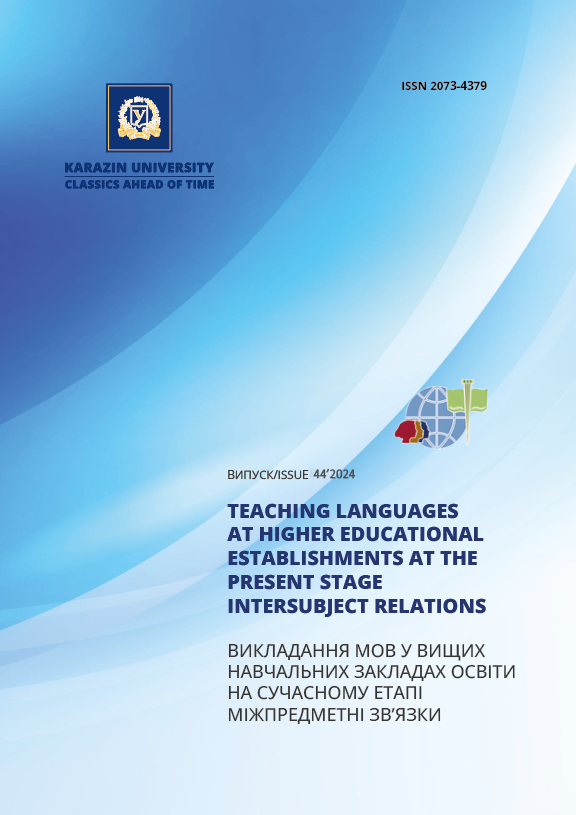Professionally focused vlog in pre-service foreign language teacher education
Abstract
The phenomenon of “vlogging” is articulated through its pivotal role in the professionally focused communicative competence development of pre-service foreign language teachers, particularly those specializing in English. The exploration encompasses a review of both domestic and international scholarly contributions. A professionally focused vlog is conceptualized as an information and research project that is educational in form and professional in content delineating the trajectory of the prospective teacher’s future career. Its genesis is ascribed to contemporary pedagogical demands for the establishment of an enriching multimedia educational environment, envisioned to foster the augmentation of interaction; the integration of authentic online resources and tasks, inciting students to explore diverse professional and pedagogical issues; the cultivation of the skills pertinent to both independent and collaborative information gathering, transforming it into a profound learning experience that steers clear of a linear sequence in favor of a comprehensive array of sources for forging personalized learning pathways.
Professionally focused foreign language vlogs are posited to ensure the attainment of intercultural foreign language communication competences among professionals in educational domains, contingent upon adherence to specific stipulations. They entail: setting explicit project objectives aligned with authentic outcomes reflective of prospective professional activities; creating quasi-professional tasks (a partial analogue of a professional one) designed to enhance university-level students’ professional motives and interests in teaching languages and cultures, and modelling situations that closely mirror challenges pertinent to professional advancement; maintaining a project log for a 4-5 weeks duration, meticulously managing ordered stages of work during classroom and extracurricular activities, accompanied by a set of exercises and tasks for improving linguistic, speech, educational-strategic and socio-cultural competences; promoting personalised learning to explore topics that align with their professional aspirations; facilitating reflection practices, taking into account the obstacles students encountered and the resolution strategies they surmounted in pursuit of project goals; emphasizing self-regulation, critical appraisal and revision.
Downloads
References
Andrusiak, I.V. (2016). Bloh-terminy yak skladova anhlomovnoi blohosfery [Blog-terms as the component of English language blogosphere]. Suchasni doslidzhennia z inozemnoi filolohii [Contemporary studies of foreign language philology], 14, pp. 15-23 [in Ukrainian].
Arvanitopulo, E.G. (2007). Navchalni proekty z inozemnoi movy dlia uchniv starshoi shkoly [Foreign language learning projects for high school students]. Inozemni movy [Foreign languages], 1, pp. 14-18 [in Ukrainian].
Asoiants, P.H., Ivanova, O.O. (2014). Metodychni perevahy vykorystannia informatsiino-komunikatsiinykh tekhnolohii u protsesi formuvannia anhlomovnoi profesiino oriientovanoi leksychnoi kompetentnosti [Methodological advantages of information and communication technology use in the development of English professionally oriented lexical competence]. Teoretychni pytannia kultury, osvity ta vykhovannia [Theoretical issues of culture, education and upbringing], 49, pp. 90-97 [in Ukrainian].
Borysko, N.F. (2018). Problems of cross-cultural training of pre-service foreign language teachers. Foreign languages, 1, pp. 9-20. DOI: https://doi.org/10.32589/im.v0i1.124861 [in Ukrainian].
Melnyk, A.I. (2023). Professionally focused communicative competence of prospective foreign language university teachers as a modern trend in higher education. Foreign languages, 4, pp. 10-20. DOI: https://doi.org/10.32589/1817-8510.2023.4.295039 [in Ukrainian].
Naboka, O.G., Demchenko, M.O. (2019). Educational blog as a means of preschool teachers professional education. Information technologies and teaching aids, 69, 1, pp. 64-77. DOI: https://doi.org/10.33407/itlt.v69i1.2425 [in Ukrainian].
Ustymenko, O.M. (2017). Project-based technology in teaching foreign languages and cultures to tertiary students majoring in philology. Foreign languages, 2, pp. 44-58. DOI: https://doi.org/10.32589/im.v0i2.122627 [in Ukrainian].
Ajabshir, Z.F., Sadeghi, K. (2019). The impact of asynchronous computer-mediated іnstruction (CMI) on EFL learners’ vocabulary uptake across different proficiency levels. In Teaching English with Technology, 19 (3). Available at: http://www.tewtjournal.org [Accessed 15 Febr. 2024].
Cahyana, A.A.C. (2020). The use of Youtube Video in Teaching English for Foreign Langauge At Vocational High School. Jurnal Pendidikan Bahasa Inggris Indonesia, 8 (2). Available at: https://ejournalpasca.undiksha.ac.id/index.php/jpbi/article/view/3399 [Accessed 15 Febr. 2024].
Chapelle, C. (2019). Technology-Mediated Language Learning. In J. Schwieter & A. Benati (Eds.). The Cambridge Handbook of Language Learning (Cambridge Handbooks in Language and Linguistics, pp. 575-596). Cambridge: Cambridge University Press. DOI: https://doi.org/10.1017/9781108333603.025
Demetriou, G., Papageorgiou, G., Efstathiades, A. (2022). Effects of learning style and learning source preferences on organizational learning capability. Development and Learning in Organizations, 36 (2), pp. 14-17. DOI: https://doi.org/10.1108/DLO-03-2021-0051
Handi Pratama, S.H., Ahsanul Arifin, R., Sri Widianingsih, A.W. (2020). The Use of YouTube as a Learning Tool in Teaching Listening Skill. International Journal of Global Operations Research, 1 (3), pp. 123-129. DOI: https://doi.org/10.47194/ijgor.v1i3.56
Harefa, H.S. (2020). Using Video in Teaching Speaking. Intelektium, 1 (2), pp. 115-120. DOI: https://doi.org/10.37010/int.v1i2.170
Huang, H.-W. (2021). Effects of smartphone-based collaborative vlog projects on EFL learners’ speaking performance and learning engagement. Australasian Journal of Educational Technology, 37 (6), pp. 18-40. DOI: https://doi.org/10.14742/ajet.6623
Kristiani, P.E., Pradnyadewi, D.A.M. (2021). Effectiveness of YouTube as Learning Media in Improving Learners’ Speaking Skills. The Art of Teaching English as a Foreign Language, 1 (2), pp. 8-12. DOI: https://doi.org/10.36663/tatefl.v1i2.97
Lestari, N. (2019). Improving the speaking skill by vlog (video blog) as learning media: The EFL students perspective. International Journal of Academic Research in Business and Social Sciences, 9 (1), pp. 916-925.
Maulidah, I. (2018). Vlog: the Mean to Improve Students’ Speaking Ability. 145 (Iconelt 2017), pp. 12-15. DOI: https://doi.org/10.2991/iconelt-17.2018.3
Misdi, M., Siregar, U.D., Zein, T.T., Anggraini, D., Ananda, Z.F. (2021). Vlogs in university EFL speaking: Student-teachers’ perceptions. [Conferance paper]. Annual International Conference on Language and Literature (AICLL).
Prayudi, R.A., Hakiki, A.K., Putra, N.R.D., Anzka, T.O., Ihsan, M.T. (2021). The use of technology in English teaching & learning process. JRIP: Jurnal Riset Dan Inovasi Pembelajaran, 1 (2), pp. 102-111.
Rakhmanina, L., Kusumaningrum, D. (2017). The Effectiveness of Video Blogging in Teaching Speaking Viewed from Students’ Learning Motivation. Proceedings of ISELT FBS Universitas Negeri Padang, 5. Available at: http://ejournal.unp.ac.id/index.php/selt/article/view/7980 [Accessed 15 Febr. 2024].
Safitri, N.S., Khoiriyah, I. (2017). Students’ perceptions on the use of English vlog (Video Blog) to enhance speaking skill. ASEAN / Asian Academic Society International Conference (AASIC), pp. 240-247.
Wu, C. (2006). Blogs in TEFL: A new promising vehicle. US-China Education Review, 3 (5), pp. 69-73.

